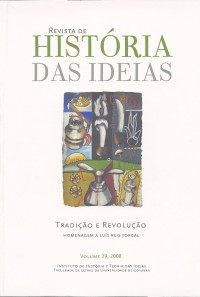Please use this identifier to cite or link to this item:
https://hdl.handle.net/10316.2/41569| Title: | Memória e mitos da Guerra Peninsular em Portugal: A História Geral da Invasão dos Franceses de José Acúrsio das Neves | Other Titles: | Memory and myths of the Peninsular War in Portugal: The General History of the French Invasion by José Acúrsio das Neves | Authors: | Araújo, Ana Cristina | Issue Date: | 2008 | Publisher: | Imprensa da Universidade de Coimbra | Abstract: | O presente artigo questiona as condições de possibilidade da construção
da memória histórica da Guerra Peninsular em Portugal. Privilegia a narrativa
histórica e os "escritos patrióticos" de José Acúrsio das Neves, cuja pré-compreensão
parece ter condicionado o nascimento da história política do século XIX. A análise da linguagem e a descodificação dos mitos, silencios e expectativas de um dos
mais significativos historiadores do primeiro quartel do século XIX revelam
que a emergência de um novo regime de historicidade não é independente da
apropriação instrumental da História e da função do historiador na sociedade
contemporânea. Mesmo suportando valores conservadores, a História retórica,
pensada em função de uma concepção secularizada do tempo, cumpre a função
de celebração de um futuro anterior, ou apenas antevisto, indicando os caminhos
do triunfo militar e do Restauração da pátria. Daí a importância que revestem os
conceitos de revolução, povo e pátria no discurso histórico e as representações
descritivas ou narratológicas da guerra, da "guerrilha" e dos actores políticos. This paper questions the conditions for the possibility of constructing the historical memory of the Peninsular War in Portugal. It focuses on the historical narrative and the "patriotic writings" of José Acúrsio das Neves, whose prescience seems to have conditioned the birth of political history in the nineteenth century. The analysis of the language and the decoding of the myths, silences and expectations of one of the most important historians of the first quarter of the nineteenth century reveal that the emergence of a new regime of historicity is not independent from the instrumental appropriation of History and from the role of the historian in contemporary society. Despite supporting conservative values, rhetorical History, thought of in relation to a secular concept of time, fulfils the function of celebrating a previous, or just foreseen, future indicating the paths of military triumph and of restoration of the homeland. Hence the importance that concepts of revolution, the people and the nation have in historical discourse, and the descriptive or narratological representations of war, of "guerrilla" warfare and of political actors. |
URI: | https://hdl.handle.net/10316.2/41569 | ISSN: | 0870-0958 2183-8925 (digital) |
DOI: | 10.14195/2183-8925_29_10 | Rights: | open access |
| Appears in Collections: | Revista de História das Ideias |
Files in This Item:
| File | Description | Size | Format | |
|---|---|---|---|---|
| memoria_e_mitos_da_guerra_peninsular.pdf | 8.88 MB | Adobe PDF |  |
Items in DSpace are protected by copyright, with all rights reserved, unless otherwise indicated.
